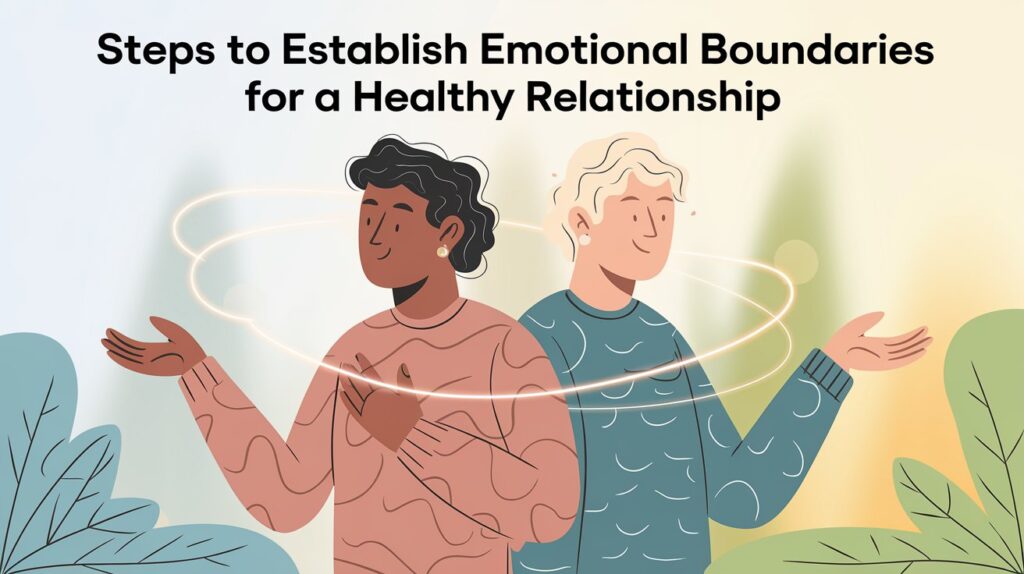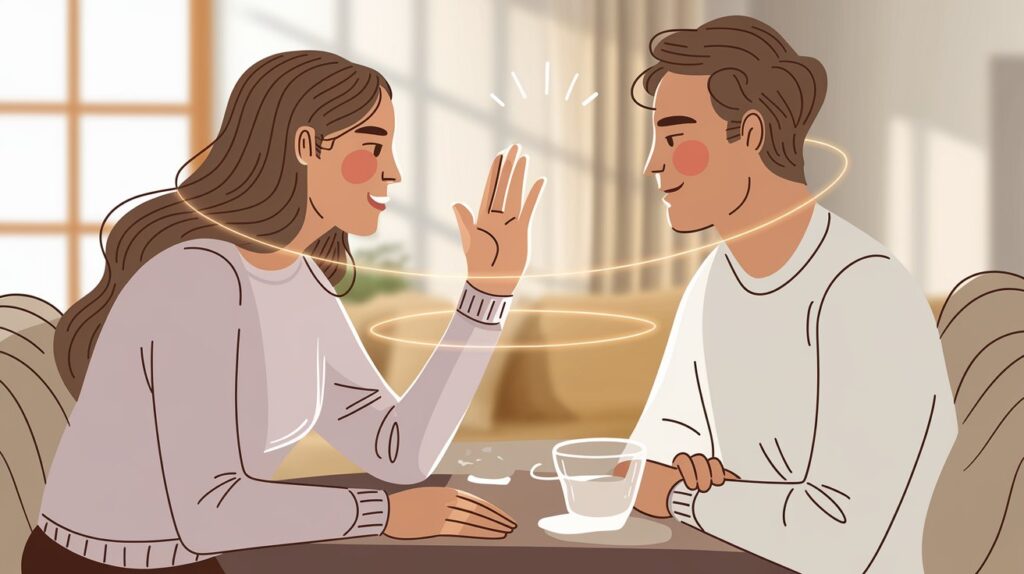Why Setting Boundaries in Relationships is Key to Lasting Love
Have you ever felt drained, overwhelmed, or even lost in a relationship? Many times, these feelings stem from a lack of healthy boundaries. Boundaries aren’t walls meant to distance us from our partners; instead, they are essential frameworks that allow relationships to thrive.
They protect our emotional well-being, foster mutual respect, and prevent the slow erosion of love and trust. In this article, we explore why setting boundaries is vital in relationships, how it can maintain healthy dynamics, and the red flags of toxic behaviors to look out for.
Table of Contents
Why Setting Boundaries in Relationships is Essential for Emotional Health

Setting boundaries in relationships plays a vital role in creating a balanced and respectful interaction between partners. It helps maintain healthy dynamics and assists in recognizing toxic behaviors that can harm the relationship.
How Boundaries Help Maintain Healthy Relationship Dynamics
Establishing boundaries in relationships is crucial for maintaining healthy dynamics. In many cases, love that was once a source of joy and fulfillment can turn into a battlefield of broken dreams and shattered hearts, emphasizing the importance of setting and respecting boundaries (Think Aloud).
By setting clear limits, individuals can protect their personal space, emotions, and overall well-being. Boundaries enable partners to express their needs and preferences openly, fostering communication and understanding.
| Type of Boundary | Description | Effect on Relationship |
| Personal Space | The physical and emotional distance individuals need | Reduces feelings of suffocation |
| Emotional Needs | The requirement to express personal feelings and emotions | Encourages support and validation |
| Time Management | Allocating time for personal activities outside the relationship | Prevents resentment and boredom |
How to Recognize and Address Toxic Behaviors in a Relationship
Toxic relationship habits, often accepted as normal, can undermine the foundation of a relationship. Recognizing and addressing these toxic behaviors is essential for establishing and maintaining healthy boundaries.
Some common signs of toxic behaviors include constant criticism, lack of support, and manipulative tactics. Setting boundaries in relationships is crucial to maintaining self-respect and knowing when to draw the line.
This involves recognizing when a partner does not see your worth and being willing to walk away from someone who cannot appreciate you (Think Aloud).
| Toxic Behavior | Description | Boundary Response |
| Constant Criticism | Regularly undermining self-esteem and worth | Request respectful communication |
| Lack of Support | Not being present in times of need | Discuss the need for emotional availability |
| Manipulation | Using guilt or fear to control actions | Establish clear communication of expectations |
By understanding the importance of setting boundaries, individuals can create healthier and more fulfilling relationships, allowing for both self-growth and mutual respect. For more on the significance of communication in fostering relationships, visit our article on importance of communication in relationships.
Self-Preservation and Setting Boundaries

Setting boundaries in relationships is essential for fostering self-respect and maintaining healthy interactions. Individuals often find themselves in situations that require them to assert their needs in order to thrive emotionally and mentally.
How to Leave a Toxic Relationship and Rebuild Your Self-Worth
Leaving a toxic relationship is a challenging but necessary step for self-preservation. Establishing personal boundaries is vital in recognizing when a partner does not value one’s worth. This awareness allows individuals to make informed choices about their relationships.
Understanding the signs of a toxic relationship can provide clarity on whether it might be time to part ways. Below is a table highlighting common indicators of toxic dynamics:
| Signs of a Toxic Relationship | Description |
| Constant criticism | Regular negative remarks about one’s abilities or character. |
| Lack of support | A partner who is unsupportive of personal goals and aspirations. |
| Manipulation | Emotional games that lead to guilt or confusion. |
| Disrespect of boundaries | Ignoring personal limits and emotional needs. |
| Unbalanced effort | One partner consistently investing more effort than the other. |
Knowing how to leave such a relationship and prioritize self-care are aspects emphasized in Think Aloud. This includes being prepared for the emotional challenges that may arise and ensuring a solid support system is in place.
Why Emotional Boundaries are Crucial for Healthy Relationships
Setting emotional boundaries is equally essential in any relationship. Each individual has different limits regarding what they are comfortable sharing and experiencing emotionally. Therefore, it is crucial to be mindful of one’s own emotional needs and to respect those of a partner.
Effective communication about emotional boundaries involves discussing feelings and needs openly. The following table outlines steps for establishing emotional boundaries:
| Steps for Establishing Emotional Boundaries | Description |
| Self-awareness | Reflect on personal emotional needs and limitations. |
| Clear communication | Express boundaries clearly and respectfully. |
| Respect for partner’s boundaries | Understand and honor what the partner needs emotionally. |
| Regular check-ins | Continuously assess and discuss emotional health and boundaries with each other. |
Setting boundaries around emotions is crucial, as highlighted by One Love Foundation. This process ensures both partners feel valued and respected in the relationship.
Establishing boundaries is a fundamental aspect of fostering self-love and healthy relationships. For additional insights on this topic, individuals may explore self-love and healthy relationships or learn about importance of communication in relationships.
How Childhood Trauma Affects Boundaries and Relationships

Impact on Adult Relationships
Childhood trauma can have profound effects on adults, influencing their physical, mental, and emotional health. This impact extends significantly into adult relationships, often shaping the way they connect with others.
Experts highlight that early trauma can lead to difficulties in trust, communication, and emotional regulation, hindering the ability to form and maintain healthy bonds (Alchemy of Love).
Individuals who experienced trauma may struggle with setting appropriate boundaries, fearing rejection or abandonment. This fear can manifest in various ways, such as overly accommodating behaviors or excessive defensiveness.
Recognizing these patterns is crucial for personal growth and relationship development.
| Type of Childhood Trauma | Common Effects in Adult Relationships |
| Lack of parental attention | Difficulty in emotional intimacy and trust issues |
| Emotional criticism | Low self-esteem and challenges in assertive communication |
| Abandonment | Fear of closeness, leading to withdrawal or clinging behavior |
Understanding the connection between childhood experiences and adult relationships is the first step in promoting healthier dynamics. By identifying these patterns, individuals can work towards establishing healthier, more fulfilling relationships.
Healing from Childhood Trauma to Build Stronger Relationships
Healing from childhood wounds is essential for fostering healthy relationships. Many adults carry core wounds from their upbringing that interfere with their ability to build intimate connections (Alchemy of Love).
Situations such as lack of attention from caregivers or emotional criticism are deeply ingrained, affecting self-worth and relationship dynamics.
Engaging in self-reflection and seeking support—whether through therapy, support groups, or self-care practices—can aid in the healing process. Individuals should focus on recognizing their value, learning to set boundaries, and communicating their needs effectively.
This journey towards self-love and healing is vital for creating and sustaining healthy relationships.
For more insights on fostering respect and understanding in relationships, consider exploring the importance of communication in relationships and tips for healthy conflict resolution in relationships.
Key Signs Your Relationship Lacks Boundaries and Balance

Recognizing signs and signals in a relationship is crucial for individuals focused on self-care and personal development. It helps them assess whether their relationship aligns with their needs for respect and love. This section outlines two key indicators: lack of care and effort imbalances.
Recognizing Lack of Care
Identifying signs that a partner is not caring is essential for determining the health of a relationship. When one partner does not value the relationship, it can lead to feelings of neglect and devaluation. Common signs indicating a lack of care include:
| Sign | Description |
| Disinterest in Conversations | The partner frequently avoids engaging in meaningful discussions or seems distracted. |
| Lack of Support | The partner does not provide emotional or situational support during tough times. |
| Ignored Commitments | Promises or plans consistently go unfulfilled without valid reasons. |
| Minimal Communication | Communication is scarce and lacks depth, often consisting of one-word responses. |
Recognizing these behaviors is crucial in deciding whether to continue or end a relationship. Setting boundaries in relationships, as discussed in this article, helps maintain self-respect and determine when it is necessary to walk away from an unappreciative partner.
Effort Imbalances
Effort imbalances in relationships can create tension and resentment. It is important to notice when one partner is putting in significantly more effort than the other. Common signs of an effort imbalance include:
| Sign | Description |
| One-Sided Initiatives | Only one partner regularly makes plans or suggestions for activities. |
| Unequal Investment | One partner takes charge of major aspects, such as finances or decision-making, while the other remains passive. |
| Disparity in Communication | One partner consistently reaches out, while the other rarely initiates contact. |
| Different Levels of Commitment | One partner is eager to discuss future plans, while the other is hesitant or indifferent. |
Recognizing these imbalances is essential to prevent settling for less than deserved. Communicating openly about efforts and expectations can help rebalance the partnership. For additional insights on effective communication, check out our article on importance of communication in relationships.
Additionally, understanding when to assert boundaries can aid in maintaining equality and respect in interpersonal relationships. For more details on establishing healthy communication dynamics, visit self-love and healthy relationships and healthy conflict resolution in relationships.
How Caring and Open Communication Strengthen Relationships

In relationships, effective communication and caring behaviors are essential for fostering healthy dynamics and personal growth. Understanding subtle signs of care and mastering effective communication skills contribute to a stronger bond between partners.
Subtle Signs of Care
Recognizing the subtle signs that indicate genuine care can be pivotal in discerning true intentions within a relationship. While grand gestures are often memorable, small indicators can speak volumes about one’s feelings. Here are some subtle signs to look out for:
| Signs of Care | Description |
| Active Listening | Engaging with attention when the partner speaks, showing interest in their thoughts and feelings. |
| Small Acts of Kindness | Regularly performing little tasks or favors, like bringing a favorite snack or offering help. |
| Thoughtful Questions | Asking about their day or feelings, indicating they care about their partner’s well-being. |
| Nonverbal Cues | Utilizing body language, such as maintaining eye contact and using open posture, to express warmth and interest. |
| Consistent Check-Ins | Frequently reaching out just to see how the other is doing, showing they are thinking about them. |
Identifying these subtle expressions is important for individuals focusing on self-love and healthy relationships, allowing them to appreciate what it means to be cared for while also enhancing their self-esteem.
Effective Communication Skills
Effective communication is not limited to the words spoken; it encompasses nonverbal cues and the way messages are delivered. Here are some key principles for cultivating effective communication skills in relationships:
- Be Direct: It’s vital to communicate needs directly. Letting the partner know if one seeks support, advice, or merely needs to vent can prevent miscommunication.
- Utilize Nonverbal Cues: Pay attention to tone, facial expressions, and body language. These cues can greatly affect the interpretation of messages (One Love Foundation).
- Create Space for Open Dialogue: Establish a judgment-free area by setting aside dedicated time for discussions, such as a weekly ‘Bae Sesh’. This fosters understanding and closeness.
- Encourage Balanced Conversations: Ensure that both partners have equal opportunities to express themselves. No conversation should feel one-sided, allowing each person to feel acknowledged and respected (One Love Foundation).
Engaging in effective communication is vital for importance of communication in relationships, allowing partners to connect on a deeper level while maintaining individual boundaries. Consequently, these practices can enhance relationship satisfaction and personal growth.
Establish Emotional Boundaries for a Healthy Relationship

Setting emotional boundaries within relationships is vital for fostering mutual respect and understanding. This involves recognizing and respecting each partner’s comfort levels while creating an environment wherein both individuals feel safe expressing their feelings.
Respecting Partner’s Boundaries
Recognizing and honoring a partner’s emotional boundaries is crucial. These boundaries can vary significantly from one person to another, and being mindful of them demonstrates care and respect. Establishing such boundaries promotes a healthier dynamic and helps prevent misunderstandings or resentment.
| Partner’s Emotional Boundaries | Importance |
| Understanding triggers | Prevents emotional distress |
| Acknowledging personal space | Encourages individuality |
| Supporting comfort levels | Fosters trust and intimacy |
In recognizing these emotional limits, individuals build stronger, more respectful partnerships. Open discussions about feelings and comfort levels are key steps in this process. For more insights into nurturing relationships, visit our article on self-love and healthy relationships.
Creating a Judgment-Free Communication Space in Relationships
Creating a judgment-free communication space is essential for nurturing a respectful relationship. When both individuals feel safe expressing their emotions, it enables honest dialogue and fosters deeper connections.
For instance, setting aside dedicated time, such as a weekly ‘Bae Sesh,’ allows partners to openly share their thoughts and feelings without fear of judgment (One Love Foundation).
| Benefits of a Judgment-Free Space | Examples |
| Encourages honesty | Weekly discussions about feelings |
| Enhances emotional safety | Sharing concerns without fear of backlash |
| Builds intimacy | Expressing vulnerabilities openly |
By cultivating an atmosphere of openness and respect, partners can learn to navigate conflicts constructively. For insights on navigating disagreements, explore our article on healthy conflict resolution in relationships. Emphasizing the importance of importance of communication in relationships is crucial as effective communication reinforces emotional boundaries and mutual respect.
How to set boundaries in a relationship without being controlling?

Setting boundaries in a relationship is essential for maintaining mutual respect and emotional well-being without feeling controlling. It’s about communicating your needs while honoring your partner’s autonomy. Boundaries help both individuals understand each other’s limits, which fosters a healthy connection built on trust, rather than control.
The key to setting boundaries without being controlling is clarity and empathy. Start by reflecting on what you genuinely need from the relationship, whether it’s emotional support, personal space, or quality time.
When discussing these needs with your partner, use “I” statements, such as “I feel overwhelmed when…” or “I need some time to recharge.” This approach shifts the focus from blame and control to personal feelings and desires, which can make the conversation feel less like a demand and more like a pathway to understanding.
Equally important is listening to your partner’s needs and being open to compromise. Setting boundaries should be a mutual process that honors both individuals. Encourage an open dialogue where both parties can express themselves freely. This mutual respect ensures that boundaries serve as a means to protect your relationship, rather than restrict or control each other.
By being compassionate and open in your approach, boundaries become a way to strengthen your bond and promote self-love and respect within the relationship.
Conclusion
Setting boundaries in relationships is not just about protecting yourself—it’s about fostering mutual growth and respect. Healthy boundaries encourage open communication, emotional safety, and a balanced dynamic where both partners can flourish.
Recognizing toxic behaviors and knowing when to step away from a harmful relationship is a profound act of self-love. Ultimately, boundaries aren’t about pushing people away, but about inviting healthier, more meaningful connections into your life. As you reflect on your relationships, consider where boundaries could help you protect your heart and nurture the love you deserve.








5 Comments